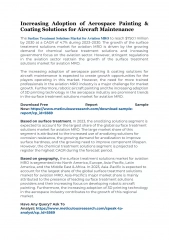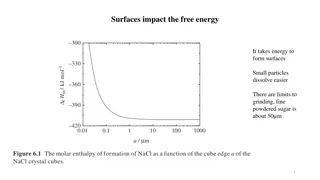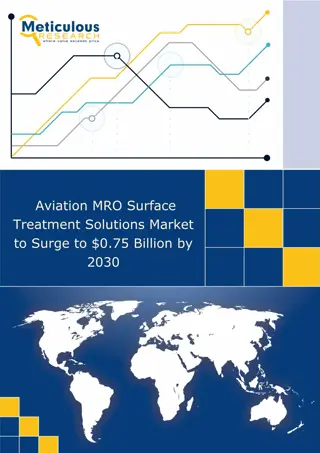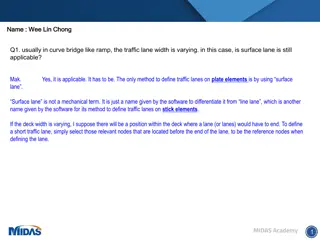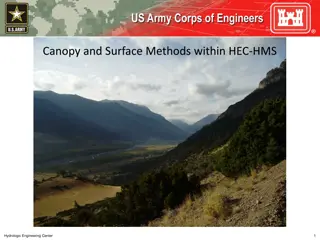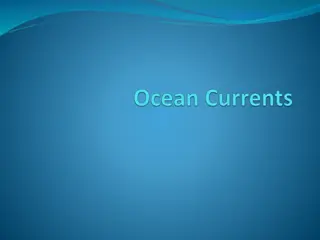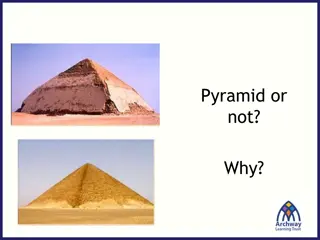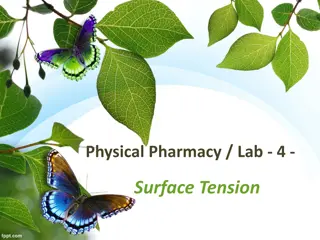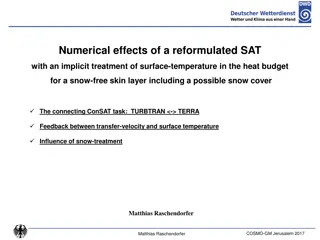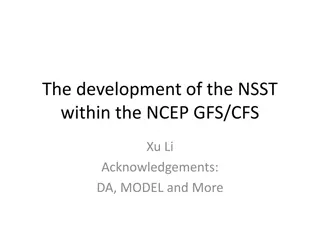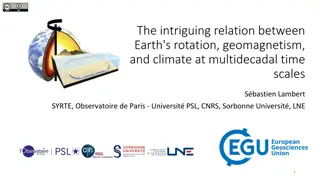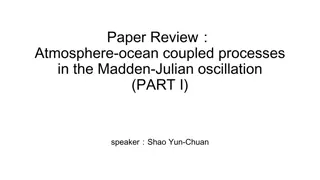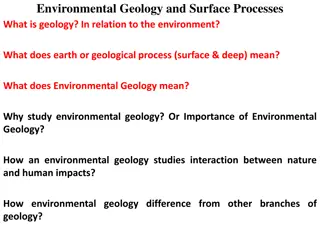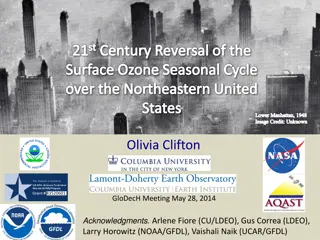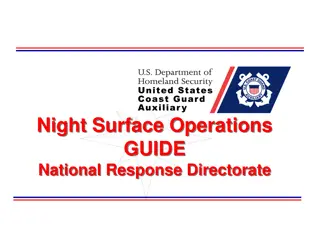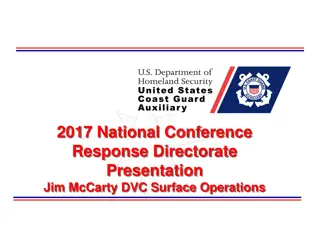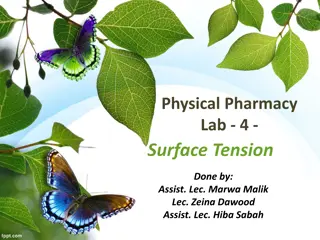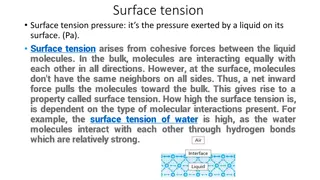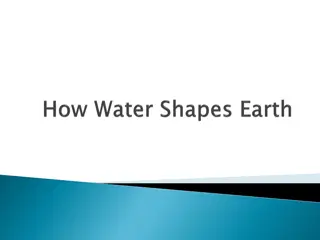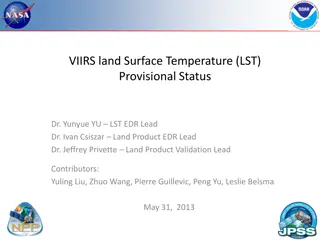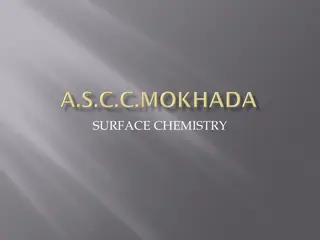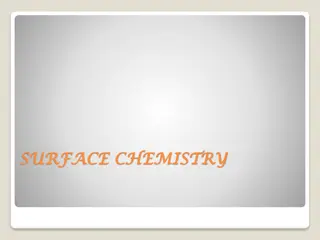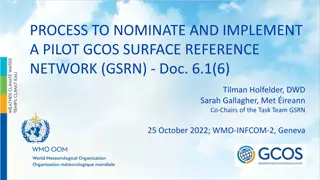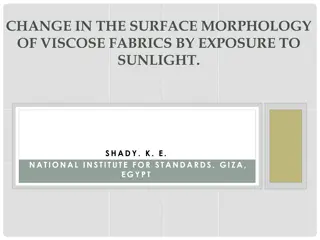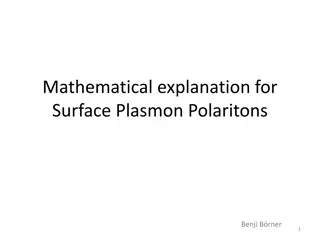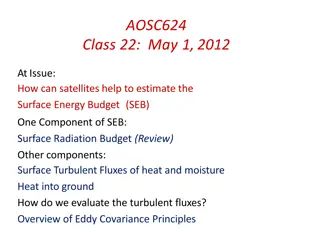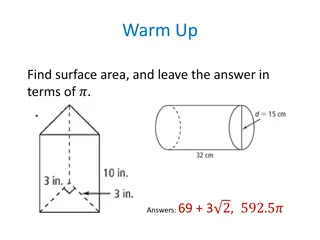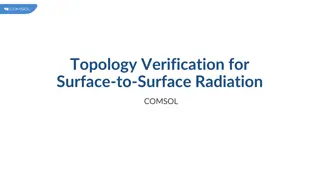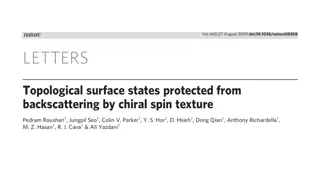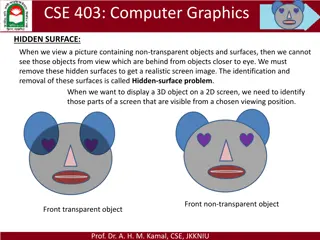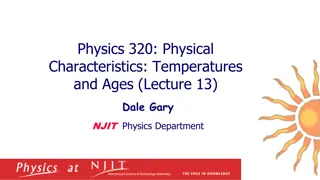Increasing Adoption of Aerospace Painting & Coating Solutions for Aircraft Maintenance
The Surface Treatment Solutions Market for Aviation MRO to reach $750.1 million by 2030 at a CAGR of 4.7% during 2023\u20132030. The growth of the surface treatment solutions market for aviation MRO is driven by the growing demand for chemical surface treatment solutions
1 views • 3 slides
Surface Tension and Wettability in Nature
Discover the fascinating world of surface tension and wettability through engaging experiments and observations, from water cohesion on a penny to the microscopic structures on lotus leaves. Delve into the role of cohesion and adhesion, surface wettability factors, and everyday applications of these
2 views • 17 slides
Surfaces and Interfacial Energy in Chemistry
Surfaces play a crucial role in free energy and dissolution processes, impacting surface tension and interfacial energy. Learn about the adsorption of molecules, surface excess properties, and the contributions of surface area and curvature to surface energy. Dive into concepts such as Laplace's equ
6 views • 71 slides
Aviation MRO Surface Treatment Solutions Market
Meticulous Research\u00ae\u2014a leading global market research company, published a research report titled, \u2018Aviation MRO Surface Treatment Solutions Market by Surface Treatment (Anodizing Solutions, Chemical Treatment Solutions, Plating Solutions, Coating & Painting Solutions, Non-Destructive
8 views • 3 slides
Aviation MRO Surface Treatment Solutions Market to Surge to $0.75 Billion by 203
Meticulous Research\u00ae\u2014a leading global market research company, published a research report titled, \n\u2018Aviation MRO Surface Treatment Solutions Market by Surface Treatment (Anodizing Solutions, Chemical\n Treatment Solutions, Plating Solutions, Coating & Painting Solutions, \nNon-Destr
0 views • 3 slides
Indian Restaurants Florida
Take a spin on India's rich culinary whe\u00adel right in the heart of Florida's buzzing dining are\u00adna. Indian eateries he\u00adre swirl you through the spice-sce\u00adnted lanes of the Indian subcontine\u00adnt. From Orlando's bustling lanes to Jacksonville's seaside\u00ad allure, these place\
0 views • 4 slides
Learn About Surface Area of Pyramids and Cones
Explore lessons, videos, and resources to understand and calculate the surface area of pyramids and cones. Dive into informative content, watch helpful videos, access answer keys, and test your knowledge with a quiz provided by Hegarty Maths. Enhance your understanding of volume and surface area con
0 views • 11 slides
Traffic Lane Width Variation in Curve Bridge Design
In curve bridge design, traffic lane width may vary, requiring proper consideration of surface lanes for defining traffic lanes. Non-square elements, like triangular plates, may be used at deck ends due to geometric limitations. Different mesh local axes may be needed for square and non-square eleme
0 views • 15 slides
Canopy and Surface Methods in HEC-HMS
Explore the various canopy and surface methods utilized in HEC-HMS for managing water resources. Learn about canopy interception, evapotranspiration, common parameter values, and factors affecting losses. Delve into available methods, canopy storage values, and surface depression storage. Enhance yo
0 views • 12 slides
Runoff in Surface Water Systems
Runoff, the flow of precipitation and other contributions in surface streams, plays a crucial role in watershed systems. It encompasses various sources such as surface runoff, interflow, and base flow. Surface runoff, which travels over the ground surface to channels, is influenced by factors like s
1 views • 27 slides
Ocean Currents and Effects
Ocean currents play a crucial role in the movement of water across the Earth's surface. Wind-driven surface currents, influenced by the Coriolis effect, move water horizontally and impact climate patterns worldwide. Major currents extend deep below the surface and can move rapidly, while rip current
0 views • 14 slides
Surface Area in Mathematics
Delve into the concept of surface area as an essential mathematical topic, understanding its significance in everyday life and its application in various 3D shapes. Learn how to calculate surface area for different space figures like prisms and pyramids through step-by-step methods. Engage with esse
6 views • 21 slides
Pyramid Geometry for Surface Area Calculations
Delve into the concept of surface area calculations for pyramids, ranging from identifying fake pyramids to determining the surface area of iconic structures like the Great Pyramid. Learn about the essential information needed, such as base length and slant height, to derive accurate measurements. D
0 views • 32 slides
Surface Tension in Physical Pharmacy Lab
Surface tension is a crucial concept in physical pharmacy lab dealing with gas-solid or gas-liquid interfaces. It refers to the force per unit length required to balance the inward pull on the surface. Interfacial tension, cohesive forces, and adhesive forces play significant roles in determining su
0 views • 16 slides
Numerical Effects of Reformulated SAT with Implicit Surface Temperature Treatment
This study investigates the impacts of a reformulated SAT on the heat budget of a snow-free surface layer, particularly considering snow cover effects. The ConSAT task involves understanding the feedback between transfer velocity and surface temperature. The research aims to address issues related t
2 views • 20 slides
Bicycle Safety and Preventative Measures for Reducing Injuries
Bicycle accidents can be dangerous, but preventative measures like wearing helmets, creating bike lanes, and following safety guidelines can save lives. Understanding the risks, implementing pre, during, and post-event strategies, and promoting environmental changes are key to promoting bike safety.
0 views • 8 slides
Near-Surface Sea Temperature Development in NCEP GFS/CFS
This informative piece delves into the evolution of Near-Surface Sea Temperature (NSST) within the NCEP GFS/CFS, discussing its significance in Numerical Weather Prediction (NWP) systems, the utilization of sea surface temperature (SST), and the T-profile near the sea surface. It covers the role of
0 views • 28 slides
The Intriguing Relationship Between Earth's Rotation, Geomagnetism, and Climate
High correlations between Earth's rotation and climate variables have been observed at multidecadal time scales, sparking questions about a common origin. This study explores the potential causality between geomagnetism, length-of-day variations, and climate, searching for significant correlations a
0 views • 8 slides
Atmosphere-Ocean Coupling in Madden-Julian Oscillation
Atmosphere-ocean coupled processes in the Madden-Julian Oscillation (MJO) play a crucial role in intraseasonal oscillations. This paper review by Shao Yun-Chuan explores how the ocean's Sea Surface Temperature (SST) influences surface fluxes, MJO convection, and energy balance dynamics. It delves in
0 views • 17 slides
Environmental Geology and Surface Processes
Geology in relation to the environment involves studying Earth's geological processes, both surface and deep, and their impacts on nature and human activities. Environmental geology focuses on the interaction between humans and the Earth's near-surface environment, addressing hazards like erosion, f
0 views • 71 slides
Surface Ozone Seasonal Cycle Reversal Study in Northeastern United States Lower Manhattan
Study on the reversal of the surface ozone seasonal cycle over Northeastern United States Lower Manhattan, analyzing the impact of NOx and VOC emissions on Surface O3 levels. Research shows a 26% decrease in regional NOx emissions leading to changes in the seasonal cycle of surface ozone concentrati
0 views • 24 slides
Night Surface Operations Guide for Safe Conduct of Night Operations
Night Surface Operations Guide presents best practices for safe completion of surface operations responsibilities between dusk and dawn or in low visibility conditions. It emphasizes the importance of night ops training to prevent accidents citing a fatal incident in 2009. The guide underscores the
0 views • 26 slides
Night Surface Operations Safety Guide - Ensuring Crew Members' Safety
This presentation highlights the importance of safety in night surface operations, emphasizing the primary mission goal of ensuring all crew members return home safely. It discusses the culture of safety, emphasizing that safety is not just a program but a state of mind, attitude, and commitment. Th
0 views • 34 slides
Surface Tension in Physical Pharmacy Lab
Surface tension is a critical aspect in physical pharmacy lab experiments, involving the study of forces at gas-solid or gas-liquid interfaces. It is the force per unit length required to counterbalance the net inward pull on a surface. The concept extends to interfacial tension, cohesive and adhesi
0 views • 21 slides
Surface Tension: Properties, Measurement Methods, and Calculations
Surface tension is the pressure exerted by a liquid on its surface due to cohesive forces among molecules. The measurement methods include the liquid rise in a capillary tube technique, drop weight method, and bubble pressure method. The surface tension coefficient can be calculated using the equati
0 views • 12 slides
Determining Surface Tension of a Liquid Using Stalagmometer
Conduct an experiment to determine the surface tension of a liquid at room temperature using a stalagmometer. The method involves counting drops and comparing properties with known values. Clean apparatus, measure drops, calculate density, and finally, derive the surface tension of the liquid.
0 views • 9 slides
The Water Cycle and Its Impact on Earth's Surface
Water continuously moves between Earth's surface and the atmosphere in the water cycle, driven by solar energy. Precipitation falling on land forms streams and rivers that shape the landscape through erosion and deposition. Moving water carries away rock and soil, creating new landforms. Rivers carv
0 views • 8 slides
VIIRS Land Surface Temperature (LST) Calibration Approach and Data Analysis
The VIIRS Land Surface Temperature (LST) Provisional Status project, led by Dr. Yunyue Yu, focuses on improving the LST EDR through algorithm coefficient updates and calibrations. The calibration process involves regression steps and comparisons with reference datasets like MODIS Aqua LST. Various c
1 views • 29 slides
Surface Chemistry and Adsorption Phenomena
Surface chemistry is a crucial branch of chemistry that focuses on the chemical processes occurring at interfaces between different surfaces like solid-liquid, solid-gas, and liquid-gas. This field plays a significant role in various industries, including electronics. Adsorption, absorption, and sor
0 views • 15 slides
Surface Chemistry and Adsorption Phenomenon
Surface chemistry explores the interactions that occur at surfaces and interfaces, with adsorption being a key phenomenon. Adsorption involves the concentration of molecules on a surface, with adsorbents and adsorbates playing crucial roles. Desorption, the opposite process, removes adsorbed substan
1 views • 21 slides
Establishment of GCOS Surface Reference Network (GSRN) Pilot Phase
The establishment of the GCOS Surface Reference Network (GSRN) Pilot Phase aims to improve the accuracy, stability, and comparability of surface observations for Essential Climate Variables (ECVs). The GSRN will serve as the reference network for surface observations, providing data traceability and
0 views • 7 slides
Changes in Viscose Fabric Surface Morphology Due to Sunlight Exposure
This study explores the impact of sunlight exposure on the surface morphology of viscose fabrics. Direct exposure to sunlight for 120 days during summer showed significant changes in fiber surface depressions. The observed damage in mechanical properties correlated with alterations in surface morpho
0 views • 11 slides
Mathematical Insights into Surface Plasmon Polaritons
This mathematical explanation delves into the intricacies of surface plasmon polaritons, covering Maxwell's equations, wavenumbers, bulk and surface plasmon-polariton formulations, medium considerations, excitation conditions, losses, and matching examples with air, gold, and sapphire prisms. Detail
0 views • 13 slides
Satellite Applications in Estimating Earth's Surface Energy Budget
Satellites play a crucial role in estimating the Surface Energy Budget (SEB) by providing data on various components such as Surface Radiation Budget and Surface Turbulent Fluxes. The SEB includes factors like net radiation flux, sensible and latent heat fluxes, and subsurface heat transfer. Satelli
0 views • 38 slides
Geometry Concepts for Surface Area Calculations
Explore various geometric shapes such as pyramids and cones to calculate surface area. Learn the differences between prisms and pyramids, understand the importance of altitude and slant height in pyramids, and differentiate between lateral and surface areas. Practice finding lateral and surface area
0 views • 16 slides
Surface-to-Surface Radiation Verification and Boundary Detection in COMSOL
Explore the verification of surface-to-surface radiation setups in COMSOL, detecting incorrect radiation configurations with nonradiating boundaries. Learn how to identify and resolve nonradiating boundaries, ensuring accurate and effective radiation simulations. Discover the importance of selecting
0 views • 10 slides
Surface Analysis of STM Bi0.92Sb0.08(111) with Spectroscopic Techniques
Explore the surface properties of STM Bi0.92Sb0.08(111) using advanced spectroscopic methods such as dI/dV mapping, QPI patterns, JDOS, SSP, Spin Selection Probability, ARPES, FT-STS, charge inhomogeneity, scattering of surface states, and spatial fluctuations of momentum. The images provide a detai
0 views • 10 slides
Hidden Surface Removal in Computer Graphics
In computer graphics, the hidden-surface problem refers to identifying and removing surfaces that are not visible in a given view to create a realistic screen image. Different methods like Depth Buffer (Z-Buffer) and Scan-Line are used to address this issue by determining the closest visible surface
0 views • 14 slides
Transport Layer Parameters and Examples
This content delves into the important parameters associated with the transport layer, such as the number of lanes per converter device, the number of converters per device, and the number of octets per frame. It provides examples of how these parameters are configured in different scenarios, showca
0 views • 8 slides
Surface Temperatures and Albedo in Planetary Systems
Surface temperatures and albedo play significant roles in understanding planetary characteristics. Albedo, the fraction of sunlight reflected from a planet's surface, varies among planets. By considering factors like albedo, distance from the Sun, and energy flux, we can estimate surface temperature
0 views • 10 slides
